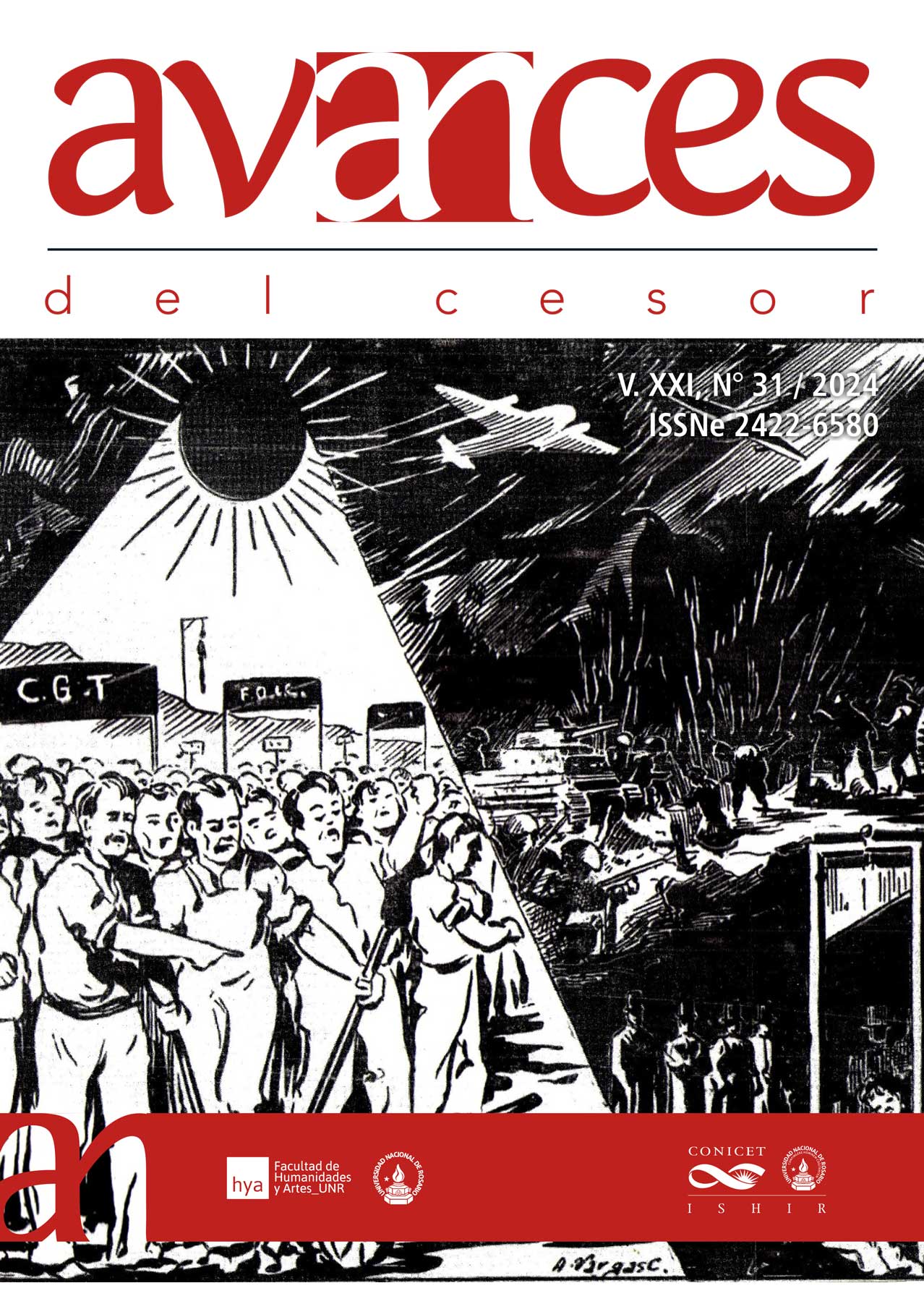Latin American fragments in the Anarchist Discourse in Chile: Transnational Intertextuality in the Local Libertarian Press (1898-1912)
DOI:
https://doi.org/10.35305/ac.v21i31.1790Keywords:
Anarchist Press, Intertextuality, Transnationalism, Chile, Latin AmericaAbstract
Between the end of the 19th century and the beginning of the 20th century, the anarchist movement in Chile was part of the transnational circulation of ideas. However, its international connections have practically not been studied. This article aims to analyze the intertextual practices of the anarchist newspapers of Chile (1898-1912), whose sources are Latin American writers and publications, in order to ponder the role of Latin American referents in the construction of local anarchist discourse. For the analysis, three levels are distinguished: the circulation of news about Latin America, the reproduction of doctrinal texts and the reproduction of literary texts. The results show, in accordance with the three levels of analysis, three different types of textual practices that tend to make visible the Latin American roots of local anarchism, but to also reinforce rather universalist aspects of internationalism.
Downloads
References
Anderson, B. (2008). Bajo tres banderas, Anarquismo e imaginación anticolonial. Madrid: Akal.
Andreu, J., Fraysse, M. y Golluscio, E. (1990). Anarkos. Literaturas libertarias en América del Sur. Buenos Aires: Corregidor.
Bajtín, M. (1990). Estética de la creación verbal. México: Siglo XXI.
Bantman, C. y Altena, B. (Eds.) (2017). Reassessing the Transnational Turn: Scales of Analysis in Anarchist and Syndicalist Studies. Oakland: PM Press.
Barthes, R. (1994). El susurro del lenguaje. Más allá de la palabra y la escritura. Barcelona: Paidós.
Barthes, R. (2011). S / Z. México: Siglo XXI.
Burke, P. (2019). Historia y teoría social. Buenos Aires: Amorrortu.
Caimari, L. (2020). La carta y el paquete. Travesías de la palabra escrita entre Argentina y Chile a fines del siglo XIX. Anuario Colombiano de Historia Social y de la Cultura, 48(2), 177-208. https://doi.org/10.15446/achsc.v48n2.95652
Chevrel, Y. (2009). Récéption, imagologie, mythocritique: problématiques croisées. L’Esprit Créateur, 49(1), 9-22. https://doi.org/10.1353/ESP.0.0046.
Cunha, E. (2019). Fortunato Serantoni y la Librería Sociológica. El circuito editorial en la red transnacional de militancia del anarquismo. Políticas de Memoria. Anuario de investigación del CeDInCI , 19, 189-210. https://doi.org/10.47195/19.567.
Delhom, J. (2014). Notes sur l’intertextualité biblique dans le discours anarchiste latino-américain. En P. Domingo, A. Lara y K. Benmiloud (Coords.), Amérique(s) anarchiste(s): Expressions libertaires du XIXe au XXIe siècle (pp. 263-293). París: Nada / Noir et Rouge
Delhom, J. y Attala, D. (Dirs.). (2014). Cuando los anarquistas citaban la biblia. Entre mesianismo y propaganda. Madrid: Catarata.
Fernández, C. (2020). Ideología y redes políticas en los inicios del socialismo en Chile (1897-1900): los casos de la Unión Socialista y El Pueblo. Izquierdas, (49), 663-683. http://dx.doi.org/10.4067/s0718-50492020000100236.
Fernández, L. (2013). Un ejercicio de lectura sobre el concierto de la prensa anarquista a partir de Mijail Bajtín (Argentina, 1895-1925). AdVersuS, X (24), 68-91. Recuperado de https://notablesdelaciencia.conicet.gov.ar/bitstream/handle/11336/23156/CONICET_Digital_Nro.ce804cb7-df57-47fa-82ca-c421dbcc7c24_B.pdf?sequence=5&isAllowed=y
Fernández, L. (2017). El periódico anarquista Nuestra Tribuna. Un diálogo transnacional en América Latina. Anuario de Estudios Americanos, 74(1), 267-293. https://doi.org/10.3989/aeamer.2017.1.10.
Genette, G. (1989). Palimpsestos. La literatura en segundo grado. Madrid: Taurus.
Giustacchini, A. (1993). Florencio Sánchez y el intertexto del teatro francés. En O. Pellettieri (Ed.), De Sarah Bernhardt a Lavelli. Teatro francés y teatro argentino, 1890-1990 (pp. 31-38). Buenos Aires: Galerna.
Godoy, C. F. de (2018). ‘I Senza Patria’. Padrões de difusão transnacional do movimiento anarquista e sua recepção em São Paulo. En K. Santos y R. Silva (Orgs.), História do Anarquismo e do Sindicalismo de Intenção Revolucionária no Brasil (pp. 71-96). Curitiba: Prismas.
Godoy, E. (2016), Historia e historiografía del anarquismo en Chile. Cuadernos de Historia, 44, 101-137. http://doi.org/10.4067/S0719-12432016000100005.
Golluscio, E. (2004). La utopía contrariada. En O. Pellettieri (Ed.), Reflexiones sobre el teatro (pp. 205-219). Bueno Aires: Galerna / Fundación Roberto Arlt.
Grez, S. (2007). Los anarquistas y el movimiento obrero. La alborada de “la Idea” en Chile, 1893-1915. Santiago: LOM Ediciones.
Grez, S. (2012). Resistencia cultural anarquista: poesía, canto y dramaturgia en Chile, 1895-1918. En C. Lida y P. Yenkelevich (Comps.), Cultura y política del anarquismo en España e Iberoamérica (pp. 259-296). México: El Colegio de México.
Hirsch, S. & Van der Walt, L. (2010). Anarchism and Syndicalism in the Colonial and Postcolonial World, 1870-1940: the Praxis of National Liberation, Internationalism, and Social Revolution. Leiden: Brill.
Kristeva, J. (1981). Semiótica 1. Madrid: Fundamentos.
Laforcade, G. (2015). Migrants transnationaux et anarchisme en Amérique latine, fin de XIXe siècle-début du XXe siècle. Revue d’histoire du XIXe siècle, 51, 107-123. https://doi.org/10.4000/rh19.4926.
Laforcade, G. & Shaffer, K. (Ed.). (2015). In Defiance of Boundaries. Anarchism in Latin American History. Gainesville: University Press of Florida.
Lagos, M. (2018). Experiencias educativas y prácticas culturales anarquistas en Chile (1890-1927). Santiago: Centro Inocencio Pellegrini Lombardozzi.
Ledesma, N. (2012). Los médicos anarquistas antifascistas y el control de la natalidad. Los puentes intertextuales sobre el Atlántico. España y Argentina (1920-1940). Cuadernos del Sur - Historia, 41, 157-187. Recuperado de https://revistas.uns.edu.ar/csh/article/view/1631.
Litvak, L. (1981). Musa libertaria: arte, literatura y vida cultural del anarquismo español (1880-1913). Barcelona: Antoni Bosch.
López, J. (2019). La Federación Anarquista Uruguaya (FAU) y la producción intertextual del anarquismo latinoamericano. Ciencia Política, 14(28), 128-157. https://doi.org/10.15446/cp.v14n28.79137.
Margarucci, I. (2020). Repensando el anarquismo en América Latina. ¿Del nacionalismo metodológico a un giro transnacional incompleto? Prohistoria, 34, 251-280. Recuperado de https://ri.conicet.gov.ar/bitstream/handle/11336/207770/CONICET_Digital_Nro.8233ca65-518c-4e43-abe9-daaff57cd188_B.pdf?sequence=2&isAllowed=y
Margarucci, I. y Godoy, E. (2019). Anarquismos en confluencia. Chile y Bolivia durante la primera mitad del siglo XX. Santiago: Eleuterio.
Margarucci, I. y Godoy, E. (2020). Anarquistas “en movimiento”. Redes de circulación e intercambio en el Norte Grande, 1900-1930. Diálogo Andino, 63, 249-260. http://dx.doi.org/10.4067/S0719-26812020000300249.
Mendoza, A. (2003). Los intertextos: del discurso a la recepción. En A. Fillola y P. Cerrillo (Coords.), Intertextos: aspectos sobre la recepción del discurso artístico (pp. 17-60). Cuenca: Universidad de Castilla-La Mancha.
Migueláñez, M. (2019). Editar la anarquía desde el Río de la Plata. Alcances de la cooperación transfronteriza (1890-1939). Historia y Política, 42, 85-115. https://doi.org/10.18042/hp.42.04.
Moya, J. C. (2015). Transference, Culture, and Critique: The Circulation of Anarchist Ideas and Practices. En G. De Laforcade y K. Shaffer (Eds.), In Defiance of Boundaries. Anarchism in Latin American History (pp. 326-334). Gainesville: University Press of Florida.
Muñoz, V. (2013). Sin dios ni patrones. Historia, diversidad y conflictos del anarquismo en la región chilena (1890-1930). Valparaíso: Mar y Tierra.
Olalla, M. (2014). Mesianismo, escatología e intertextualidad bíblica en el discurso anarquista: la concepción de la historia en el pensamiento estético político de Alberto Ghiraldo. En J. Delhom y D. Attala (Dirs.), Cuando los anarquistas citaban la biblia. Entre mesianismo y propaganda (pp. 111-129). Madrid: Catarata.
Sánchez, E. (2018). Anarquismo, francofilia y nación: Juan Emiliano Carulla frente a la Gran Guerra. Avances del Cesor, 15(18), 109-133. https://doi.org/10.35305/ac.v15i18.813.
Santini, B. (2014). Intertextualidad bíblica en ‘Rebeldías líricas’ (1913) de José Domingo Gómez Rojas: religión, creación e ideales anarquistas. En J. Delhom y D. Attala (Dirs.), Cuando los anarquistas citaban la biblia. Entre mesianismo y propaganda (pp. 171-182). Madrid: Catarata.
Santos, K. (2020). A bandeira negra entre otras: (trans) nacionalismo e internacionalismo na construção do anarquismo no Brasil (1890-1930). Crítica Histórica, 21, 34-65. https://doi.org/10.28998/rchv11n21.2020.0004.
Suriano, J. (2008). Anarquistas. Cultura y política libertaria e Buenos Aires, 1890-1910. Buenos Aires: Manantial.
Taibo, C. (2018). Anarquistas de Ultramar. Anarquismo, indigenismo, descolonización. Santiago: Eleuterio.
Tarcus, H. (2013). Marx en la Argentina. Sus primeros lectores obreros, intelectuales y científicos. Buenos Aires: Siglo XXI.
Turcato, D. (2007). Italian Anarchism as a Transnational Movement, 1885-1915. International Review of Social History, 52(3), 407-444. https://doi.org/10.1017/S0020859007003057.
Van der Walt, L. (2016). Global Anarchism and Syndicalism: Theory, History, Resistance. Anarchist Studies, 24(1), 85-106. Recuperado de https://journals.lwbooks.co.uk/anarchiststudies/vol-24-issue-1/abstract-9310/.
Published
How to Cite
Issue
Section
License

This work is licensed under a Creative Commons Attribution 4.0 International License.
Avances del CESOR ratifies the Open Access model in which the contents of scientific publications are fully available for free on the Internet, without temporary embargoes, and whose publishing costs are not transferred to the authors. This policy aims to break the economic barriers that generate inequities in access to information, and publication of research results.
Authors retain the copyrights of their papers and grant the journal right of first publication with the work simultaneously licensed under a Creative Commons that allows others to share the work with an acknowledgement of the work's authorship and initial publication in this journal.

















































